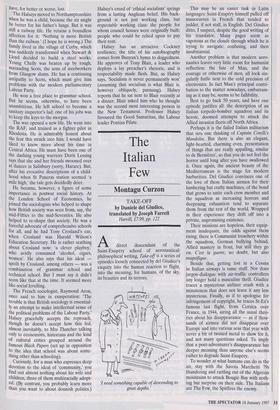The Italian Few
Montagu Curzon
TAKE-OFF by Daniele del Giudice, translated by Joseph Farrell Harvill, £7.99, pp. 122 Adirect descendant of the Saint-Exupery school of aeronautical/ philosophical writing, Take-off is a series of episodes loosely connected by del Giudice's enquiry into the human reaction to flight, into the meaning, for humans, of the sky, its beauties and its terrors.
7 need something capable of descending to great depths.' This may be an easier task in Latin languages: Saint-Exupery himself pulled off manoeuvres in French that tended to judder, if not stall, in English. Del Giudice ditto, I suspect, despite the good writing of his translator. Many pages seem as vaporous as the clouds through which he is trying to navigate: confusing, and then insubstantial.
Another problem is that modern aero- nautics leaves very little room for humanist reflection: the fate of Man, and the courage or otherwise of men, all look sin- gularly futile next to the cold precision of electronics. In fact Man's principal contri- bution to the matter nowadays, embarrass- ing as it may be, seems to be fallibility.
Best to go back 50 years, and here one episode justifies all: the description of an Italian torpedo-bomber squadron and its heroic, doomed attempts to attack the Allied invasion fleets off North Africa.
Perhaps it is the failed Italian militarism that sets one thinking of Captain Corelli's Mandolin. But there is also an elegant, light-hearted, charming even, presentation of things that are really appalling, similar to de Bemieres', so that you do not feel the horror until long after you have swallowed it. Once again, the ancient beauty of the Mediterranean is the stage for modern barbarities. Del Giudice convinces one of the love of these Italian airmen for their lumbering but crafty machines, of the bond that grows to unite each crew member and the squadron as increasing horrors and deepening exhaustion tend to separate them from the rest of the world. Wrapped in their experience they drift off into a private, unpromising existence.
Their missions are hopeless, their equip- ment inadequate, the odds against them rising; there is Communist treachery within the squadron, German bullying behind, Allied mastery in front, but still they go on. C'est la guerre, no doubt, but also magnifique.
Beside that, getting lost in a Cessna in Italian airways is tame stuff. Nor does jargon-dialogue with air-traffic controllers any longer hold a masculine thrill. Giudice traces a mysterious airliner crash with a minuteness that does not leave it any less mysterious. Finally, as if to apologise for infringement of copyright, he traces St-Ex's famous last flight, from Corsica over France, in 1944, airing all the usual theo- ries about his disappearance — as if thou- sands of airmen did not disappear over Europe and into various seas that year with never a bit of twisted metal to show for it, and not many questions asked. To imply that a poet-adventurer's disappearance has deeper meaning than anyone else's seems rather to degrade Saint-Exupery.
To wonder at what humans can do in the air, stay with the Savoia Marchetti 79s thundering and rattling out of the Algerian mountains to attack Bougie Bay with noth- ing but surprise on their side. The Italians are The Few, the Spitfires the enemy.


























































 Previous page
Previous page